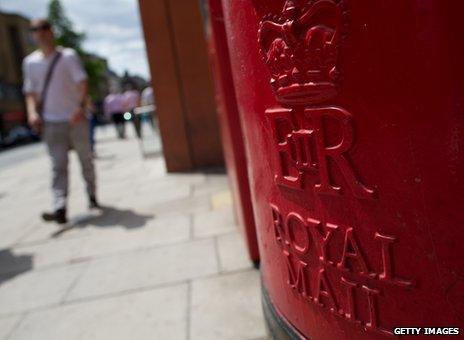Can there be a float and strike at Royal Mail?
- Published
- comments

The government's announcement of its intention to float Royal Mail on the stock exchange is not irreversible.
But it would take something of a market meltdown for the famous letters and parcels business not to become a company listed on the stock market in November - which would end a long and tortuous journey towards privatisation that began in 1992.
Royal Mail has given more detail about what it will look like in the private sector. It plans to pay a dividend to owners of £133m next July, and would have paid £200m if it had been listed for the whole of 2013/14 - which implies that the business is worth around £3bn.
And results just published for the first three months of the year confirm the trend of declining letter volumes and rising deliveries of parcels.
At least 41% of the shares will be sold, to individuals and investment funds, and perhaps more (depending on market appetite at the time of sale) - with an additional 10% given to 150,000 Royal Mail employees.
So almost all of Royal Mail's people (it employs 167,000 in total) will be endowed with about £2000 each of free shares, paying an annual dividend or income to them of around £133.
And Royal Mail staff will have first dibs over the public if they want to buy shares - and can subscribe for a minimum of £500 of stock, compared with a minimum purchase of £750 for everyone else.
But here is what is very unusual about this share sale. It is taking place at a time when the CWU union is balloting its 125,000 Royal Mail members on a strike, over pay, pension changes and post-privatisation terms and conditions of work.
As Royal Mail admits, there is a very real risk of its shares being offered for sale, including to postal workers, at a time when industrial action brings the mail service to a standstill.
I can certainly never remember any business being sold on the stock market at a time when it had been brought to a grinding halt by a strike. But that does not mean a flotation in those circumstances can't and won't happen.
There is the very real, or perhaps surreal, prospect, of postal workers simultaneously downing tools (parking their trolleys) and subscribing a few hundred quid for Royal Mail shares.
A couple of other things stand out for me in today's announcement.
First, that the business does appear to be on a trend of improving financial results. In the first three months of the current year, its operating profit margin (the ratio of profit to revenue) was 5%, compared with 4.4% last year and almost nothing the previous year.
And it is generating healthy amounts of cash - £110m for the first quarter of the year, which implies free cash flow will be more than £400m for the full year (which explains why it feels it can afford to pay out dividends of £200m).
What is also interesting is that it is refinancing all its debts. Or to put it another way, it will henceforth borrow from the private sector rather than from the government.
Funnily enough, this should save Royal Mail a fortune - because it is currently paying interest to the BIS department of 8.8% a year, and should be able to pay interest of less than 5% to banks and other private sector lenders.
Last year Royal Mail's interest costs were £82m on drawn borrowings of £973m. So privatisation should save it perhaps £40m of interest payments per annum to the government.
Of course there is another way of looking at this - which is that the government, taxpayers, will be £82m a year poorer.